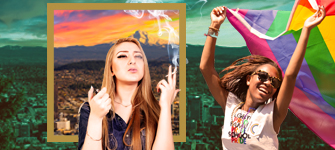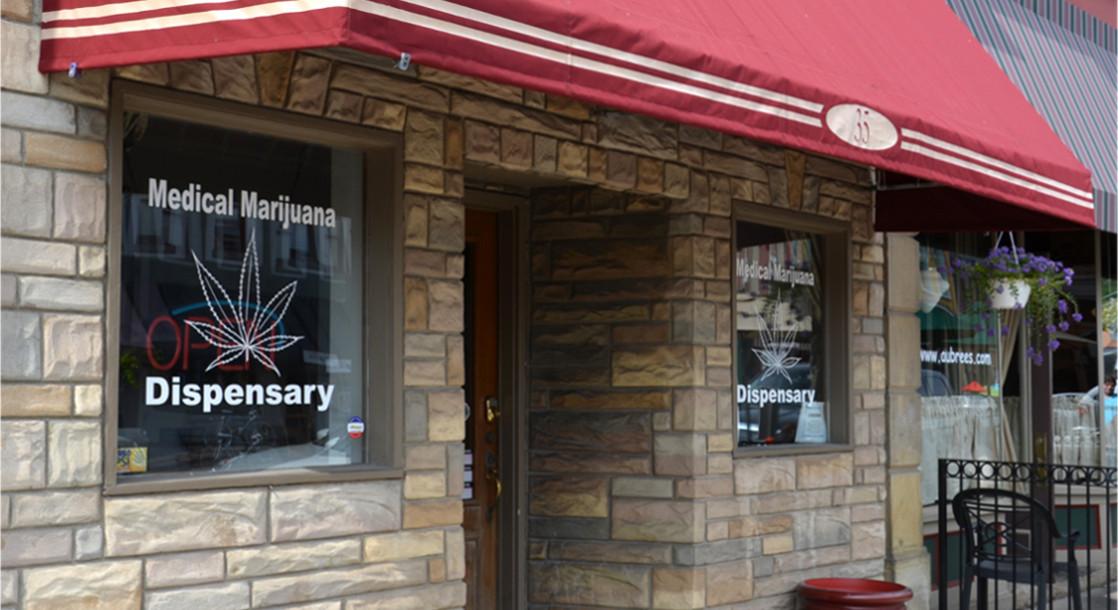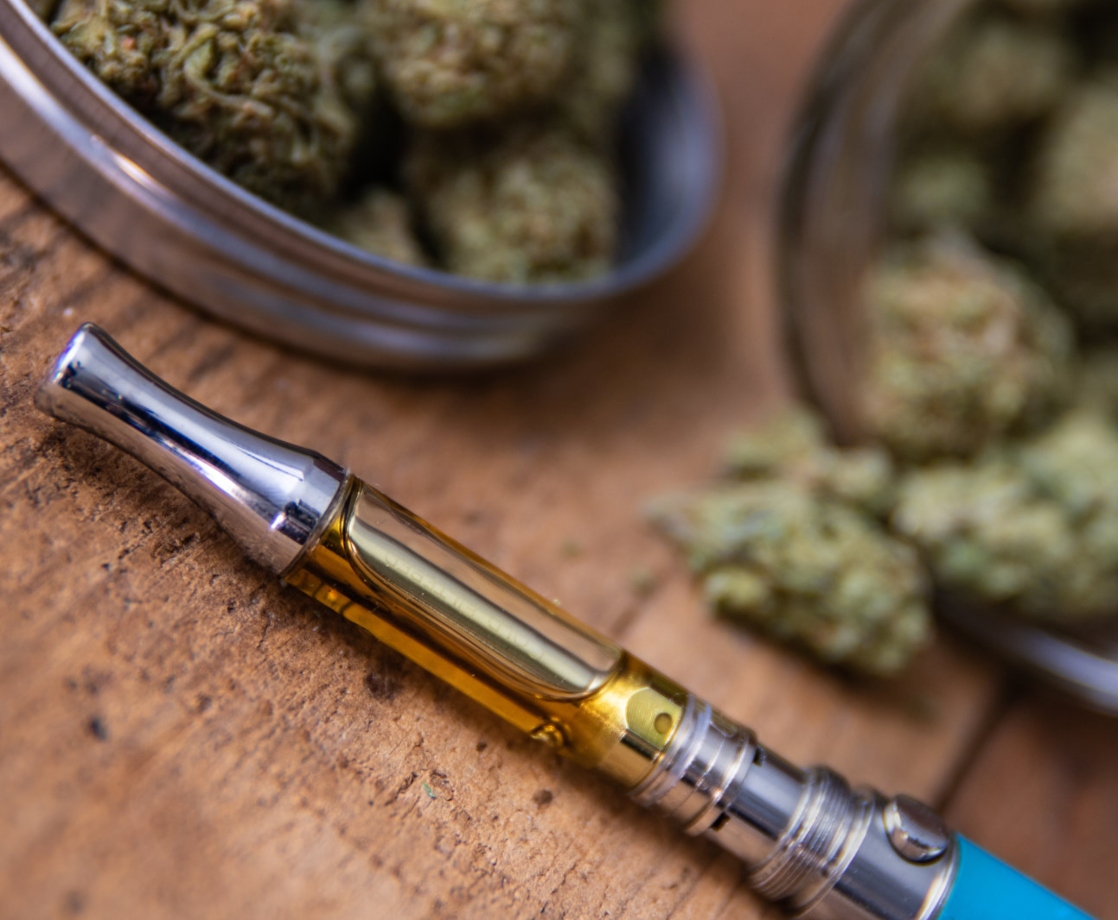All the way out in the Pacific Northwest sits Portland, Oregon, a city immortalized for all its quirkiness in the IFC show Portlandia. "Keep Portland Weird" isn't just a saying, but a way of life. When marijuana finally became legal in Oregon (first in 1998 with slow steps to legalize medical cannabis, and then again in 2015 when dispensaries began selling recreational marijuana legally) the city only cemented its status as cannabis infused clubs, outings and comedy nights began to take place.
Yet despite the city being known for its progressive ideals, there are those that have called into question the current cannabis community, where some women and people of color feel unsafe or unwelcome.
Bri Pruett, a stand-up comedian from Portland, explains how challenging it can be in the white, male dominated cannabis scene, or "Weed-Bros" as she calls it. She recently performed at a show where comedians do a stand-up set while sober, go get high, and then do another set. Pruett noticed right off the bat that her audience was pretty one note. "It was about 90% male," she describes to MERRY JANE. "Very white, and deeply masculine — lots of hats." This was a stark contrast to a similar comedy event she was a part of in Seattle, where the crowd "…was mostly mixed-gendered couples, and sweet, gentle, weed-men. So this caught me off-guard."
"During the 'smoke break,' I connected with the weed sponsors of the show. They were pressuring me hard to dab," Pruett says. "I'm not a big dab fan, feels unnatural to me. The peer-pressure, combined with the competitiveness and the fact that there were virtually NO women invited into this circle made me feel awful and not super safe!"
Pruett says that after the smoke break, she found out that a group of her friends, "beautiful, amazing, women of color," had actually attended the show, but had been physically marginalized to the back of the space. It's scenarios like that that has some dedicated folks in Portland working hard to make safe and enjoyable spaces for women, queer folks, and people of color when it comes to getting high.
Vanessa Gonzalez is the general manager of Portland Canna Connection, a dispensary that started out as a medical facility, but has morphed into also selling recreational cannabis.
"Portland is probably the whitest place i've ever been. I would say that the majority of shop owners are white," explains Gonzalez, who has worked for Portland Canna Connection for four years. "The people that [most places] do staff are white, and usually extremely heteronormative. I've been trying to stay away from that. I'm a queer, brown person. I've been doing my best to create space and give jobs to folks that fit that description. A lot of people don't get that break in an industry like this because everyone looks the same."
Gonzalez says that despite Portland's reputation as a progressive haven, it has many problems seen in other big cities, like racism, sexism, transphobia and more. With that in mind, she says that Portland Canna Connection tries to be a safe place for these marginalized communities, so they can access marijuana without judgement or fear. "We definitely try to foster a space where trans folks specifically will feel comfortable, where they know that their pronouns and gender identities will be heard. Same thing with people of color. We've been trying to foster that environment because I know a lot of folks do not feel safe going into other dispensaries because people have a tendency to be harsh and extremely judgmental to people of color in Portland. If we don't get followed around in a store, it's not a normal day in Portland."
Due to the inclusive and welcoming nature of the shop, Portland Canna Connection has seen a lot of support from underground groups for marginalized communities in the city. The dispensary is recognized as a safe space for trans folks, people of color and women of color. However, Gonzalez says she knows that actions like keeping a Black Lives Matter poster may have cost the shop some customers, but that's something she's perfectly fine with. "We've also gained a lot of trust and gained a lot of people who do walk through our doors because we openly support them."
When it comes to being a female manager, Gonzales says that it comes with its own unique set of challenges that she's learned to work with, and it's become even more challenging since recreational marijuana was legalized in Oregon. "Now that everybody can come in, it's definitely an interesting, slightly 'bro-ier' crowd that didn't have their card before," she explains about the changing demographics of cannabis culture in Portland. "And it's the same when you walk into a shop. You find a white kid with dreads, wearing a dashiki or a Grateful Dead shirt — it's a terrible stereotype, but it's true. If you ask them about the strains, they don't really know because the stores are more concerned with making sure they're fitting into the stereotypes… I'm a pre-med student, so the science behind cannabis is what I'm here for. I'm here to provide some sort of legit information for people." Yet, Gonzalez finds that many men in the industry tend to dismiss her because she's a woman.
"People have a tendency — especially men and very masculine growers — to definitely overlook either my intelligence, or my capabilities and my knowledge of product," she explains.. "They'll walk in and ask for the manager, so I'll shake their hand and they will say, 'no, I actually want to speak to the manager.' And I'll say, 'No, I'm actually right here and I can see the spider mites on your plant from here, so you can go.' There are a lot of amazing women in this industry, but I don't know of a lot of women of color in this city that are really making a name for themselves."
Thankfully, Gonzalez isn't alone in helping to create a more open, more inclusive culture surrounding cannabis that welcomes all sorts of people. Places like Panacea which is a WOC-run dispensary that donates 10% of profits to various organizations. And, there's the world famous Cannabis Cafe that's also run by a WOC. While the industry is still an "uphill battle" for women, particularly women of color, in Portland, both Gonzalez and Pruett are proud of the work diverse Portlanders are doing to ensure a more open, safe space for those who want to smoke up.











